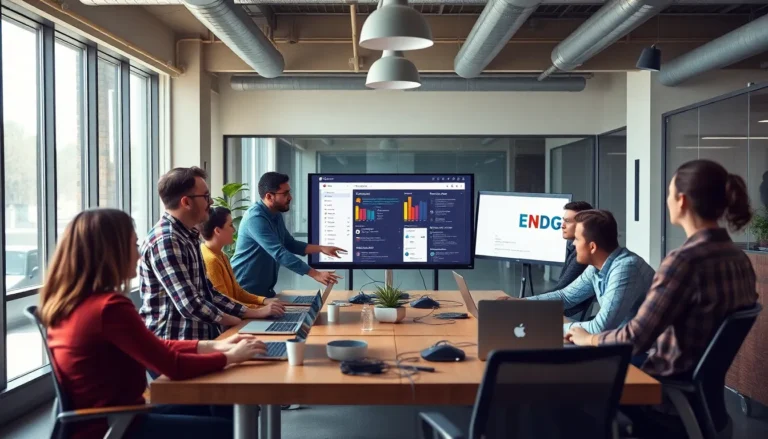Table of Contents
ToggleIn the fast-paced world of technology, software engineering trends are like fashion—what’s in today might be out tomorrow. But don’t worry, keeping up with these trends doesn’t require a crystal ball or a magic wand. It just takes a keen eye and a willingness to adapt. From AI-driven development to the rise of low-code platforms, these trends are transforming how engineers build and maintain software.
Overview of Software Engineering Trends
AI-driven development stands at the forefront of software engineering trends. This approach streamlines coding processes, minimizes human error, and enhances productivity. Adoption rates for AI tools continue growing, showcasing their effectiveness in real-time code suggestions and automated testing.
Low-code platforms also gain traction within the industry. These platforms allow engineers to build applications quickly with minimal coding knowledge, appealing to both seasoned developers and non-technical users. Their user-friendly interfaces enable teams to accelerate development cycles while maintaining high-quality outputs.
Agile methodologies sustain their popularity, emphasizing flexibility and iterative progress. By focusing on collaboration and customer feedback, teams can adapt to changing requirements quickly. This approach fosters greater communication among stakeholders, ensuring end products meet user needs.
DevOps practices further evolve, promoting integration between development and operations teams. This collaboration strengthens productivity and speeds up deployment times, facilitating continuous delivery. Organizations that embrace DevOps culture often experience enhanced team dynamics and reduced time to market.
Cybersecurity remains a critical consideration as software becomes more complex. Engineers prioritize secure coding practices and implement advanced security measures to combat rising threats. Awareness of potential vulnerabilities shapes software design and development processes.
Remote work continues influencing software engineering trends. Managers and teams adapt to flexible work arrangements, utilizing tools that support collaboration, communication, and project management. This shift fosters diverse talent acquisition and broadens the hiring pool, enhancing innovation within the industry.
These trends demonstrate the dynamic nature of software engineering, where adaptability and embracing new technologies ultimately define success.
Emerging Technologies in Software Engineering

Emerging technologies significantly impact software engineering, shaping development practices and project outcomes. These advancements include artificial intelligence, machine learning, and blockchain technology.
Artificial Intelligence and Machine Learning
Artificial intelligence and machine learning drive innovation in software engineering. They automate repetitive tasks, allowing engineers to focus on complex problem-solving. Real-time code recommendations and intelligent debugging enhance coding efficiency. Various tools utilize machine learning algorithms to analyze code patterns, improving overall quality. Teams benefit from predictive analytics that optimize decision-making based on historical data. As a result, developers experienced in AI technologies enhance their project’s effectiveness.
Blockchain Technology
Blockchain technology transforms software engineering by offering decentralized solutions. It ensures transparent and secure transactions, which benefits sectors such as finance and supply chain management. Engineers use blockchain for smart contracts, reducing reliance on intermediaries. This technology fosters trust among participants by maintaining immutable records. Various organizations explore blockchain’s potential for secure data sharing, making it attractive for building decentralized applications. Consequently, the demand for blockchain expertise among software developers continues to rise.
Agile Methodologies and Development Practices
Agile methodologies remain essential in software engineering. These practices enable teams to adapt quickly while prioritizing collaboration and feedback.
Emphasis on Continuous Integration and Continuous Deployment
Continuous integration and continuous deployment (CI/CD) play a critical role in streamlining development processes. CI promotes frequent integration of code changes, reducing integration problems. Deploying updates continuously ensures that software remains up-to-date and functional. High-performing teams leverage CI/CD to automate testing and deployment, enhancing overall efficiency. These practices significantly shorten release cycles, which makes it easier to respond to market changes and user feedback.
DevOps Integration
DevOps integration fosters collaboration between development and operations teams. This partnership improves communication, breaking down silos that often hinder progress. By adopting DevOps practices, teams increase deployment frequency and reduce lead times for changes. Continuous delivery practices, when combined with automation, ensure that software systems are reliable and sustainable. Tools that support DevOps, such as container orchestration and monitoring solutions, further enhance efficiency and accountability in the software development life cycle.
Cloud Computing Advancements
Cloud computing trends continue to reshape the software engineering landscape, enabling organizations to enhance scalability, flexibility, and efficiency. As organizations adopt innovative approaches, they streamline their operations and improve overall performance.
Serverless Architecture
Serverless architecture allows developers to focus on writing code without worrying about infrastructure management. By enabling automatic scaling, it reduces operational costs and increases deployment speed. Applications automatically adjust resources based on user demand, ensuring optimal performance. This model also promotes multimodal applications, facilitating seamless integration across various cloud services. Companies leveraging serverless computing experience faster time-to-market and enhanced productivity.
Hybrid Cloud Solutions
Hybrid cloud solutions combine public and private cloud environments, offering the best of both worlds. Organizations benefit from enhanced flexibility and control over data and workloads. Data sovereignty and compliance become easier to manage, as businesses can store sensitive information in private clouds while utilizing public clouds for other processes. This approach fosters innovation through resource optimization, allowing teams to scale operations according to project needs. Companies embracing hybrid solutions find it easier to transition to cloud-native technologies while maintaining existing infrastructure investments.
Growing Focus on Cybersecurity
Cybersecurity has become a primary concern in software engineering as threats continue to evolve. Engineers emphasize the significance of secure coding practices to mitigate vulnerabilities and protect sensitive data.
Importance of Secure Coding Practices
Secure coding practices safeguard applications from potential attacks. Many developers integrate security measures into their workflow to address risks early in the development cycle. Awareness of common vulnerabilities, such as SQL injection and cross-site scripting, remains critical for reinforcing application security. Staff training on secure coding techniques helps foster a culture of cybersecurity within teams. Regular code reviews and automated security testing contribute to identifying vulnerabilities before deployment. By prioritizing security in the development process, organizations reduce the likelihood of costly breaches while enhancing user trust and satisfaction.
The landscape of software engineering is ever-evolving and requires professionals to remain agile and responsive to new trends. Embracing advancements like AI-driven development and low-code platforms can significantly enhance productivity and streamline processes.
As teams increasingly adopt Agile methodologies and DevOps practices, the focus on collaboration and continuous integration becomes paramount.
Moreover, prioritizing cybersecurity and leveraging emerging technologies like blockchain and cloud computing will ensure that software solutions are not only efficient but also secure and reliable.
Staying informed about these trends is vital for any engineer aiming to thrive in this dynamic field.







